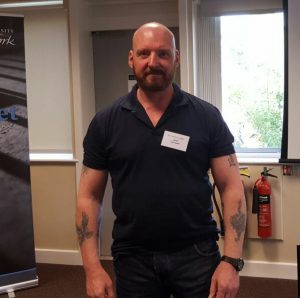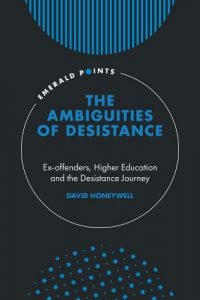The complexities of the lived experience position
Written by David Honeywell, Research Assistant, PROSPECT project
Until recently, ex-prisoner voices were mostly used for popular culture seen in books and movies (see McVicar, 1974, 2000; Boyle, 1977) but unheard of in academe. This was highlighted in the early 1970s in Stan Cohen and Laurie Taylor’s covert study while they were working as part-time sociology lecturers at Durham prison. They conducted interviews and analysed essays, diaries and letters written by a group of long-term prisoners in Durham’s infamous E wing.
This led to the publication of ‘Psychological survival of long-term imprisonment’ in 1972 but of course the prisoners were anonymised. It later came to light that one of the participants was John McVicar whose escape from Durham prison in 1968 led to a movie ‘McVicar’ and bestselling autobiography ‘McVicar by himself’. Eventually McVicar was recaptured and sent back to prison where he took up study gaining several A levels including sociology until his release in 1978 when he went on to university.
McVicar’s lived experience influenced my own initial journey towards education. While I was serving a prison sentence also in Durham prison, I managed to get a copy of his autobiography. It was only by off chance I was able to get a hold of this book. This was mainly because it was banned from the prison which just shows how the importance of such a book completely bypassed the authorities. Yet such stories are now seen as educational and I am pleased to see these very same books on university criminology reading lists.
The term ‘lived experience’ has now become widely used in the social sciences over recent years but there has been little if any real clarity about what ’lived experience’ actually means. For me the lived experience refers to someone who has life experiences which are relevant to a specific topic or subject area and role.
Those who draw on their past experiences of substance use to work as drugs counsellors have relevant lived experience and many see themselves as ‘wounded healers’ (Maruna, 2001, p.102). In relation to my own positionality, I have lived experience of the criminal justice system as a former prisoner and I am able to draw on this in my current role as a researcher at the University Manchester on the PROSPECT project.
Therefore, the lived experience can offer an additional dynamic and there is no better example than my role as a convict criminologist. Convict criminologists are academics who have lived experience of prison which we draw on for our research and teaching methods. We don’t advocate that we know better because we have been in prison, but rather we can offer an additional perspective that for many years has been silent within academe or not taken seriously.
But my lived experience only became relevant once I decided to share my past experiences and ‘come out’ as an ex-offender. Not everyone with lived experiences wants to share their most personal experiences and especially their most painful memories.
To put this into perspective you would have to imagine the worst thing you have done in your life and then use it to continually reflect on when speaking at conferences, teaching students and writing papers. This may seem a worthy cause, but it can also be paralleled to repeatedly ripping a plaster off a cut which can then never heal.
I have learned over many years how to cultivate my past experiences and when to shut them out. For example, in 2018 I was awarded a PhD for my study of ex-prisoners and the transformation of self in higher education which was centred around my own experiences. I was very proud of my achievement, but it came with many challenging experiences.
I had underestimated the impact the interviews could have on me and how much the lives of those I was interviewing would impact on my own sense of self. I began to question my own position as a researcher and I soon realised I was on the same journey as my interviewees. I was still in higher education and still trying to reach certain goals and turn my life around. But more than this I became quite traumatised during my PhD study because each story I listened to opened up my old wounds too and so learning to deal with that was essential.
Beyond the PhD, my lived experiences started to become more sought after through guest talks across the university circuit and eventually as a researcher at the University of Manchester. Although I have now been teaching criminology for a number of years, where I use my personal experiences in my teaching, the PROSPECT study was the first time my lived experience became an essential criterion for my job role.
I continue to draw on my past experiences when teaching students and doing research which is personally satisfying because I know I am making a difference. Most importantly though, is that the prisoner’s and ex-prisoner’s voice is being heard. Since the bygone years where the experiences of prison brutality and inhumane conditions and violence were seen as entertainment, they are now being challenged and presented in academic journals and books. Ex-prisoners are now openly teaching in universities and their experiences are being taken seriously.
It’s very poignant to think that something that happened so long ago still impacts my life even today. During COVID-19 I have had lots of opportunities to reflect, as I know many others have, and there have been times during the last few months when I have felt some of the same emotions I recall during my incarceration.
The irony of my predicament now is that while my time in prison was soul destroying and very damaging to my future chances of employment in mainstream society it eventually led to me being embraced by universities where I was able to carve out an academic career.
References
Boyle, J. 1977. A Sense of Freedom, London, Pan Books.
Cohen, S. and Taylor, L. 1972/1981. Psychological Survival: The Experience of Long-Term Imprisonment, Harmondsworth, Pelican.
Honeywell, D. 2018. Ex-Prisoners and the Transformation of Self through Higher Education. PhD Thesis, University of York, York.
Honeywell, D. 2020. The research experience from an insider perspective. In Issues and Innovations in Custodial Settings Health Research, Eds M. Maycock, R. Meek and J. Woodall, pp. 91–111, Cham, Palgrave Macmillan.
Maruna, S. 2001. Making Good: How Ex-Convicts Reform and Rebuild Their Lives, Washington, DC, American Psychological Association.
McVicar, J. 1974. McVicar by Himself, London, Hutchinson.
About Dr Dave Honeywell:

Dr Dave Honeywell
Dr David Honeywell is a Lived Experience Research Assistant at the University of Manchester currently working on a project on prison suicide. David began his academic career in 2013 at the University of York where he worked as an Associate Criminology Lecturer alongside studying for a PhD. He has since taught criminology at Leeds Beckett University and the universities of Durham and Hull. In 2018, he completed his PhD in sociology about ex-prisoners and the transformation of self through higher education which was inspired by his own personal journey as an ex- prisoner who escaped a dysfunctional life through learning. While in prison in the 1990’s he gained an Open University qualification which later led to degrees in criminology, social research methods and sociology. After a 10-year break from study he returned to university following the publication of his autobiography Never Ending Circles which was inspired by the aftermath of the 2011 London riots. His book led to an ongoing career as a guest speaker and visiting lecturer on the university circuit.
David has recently published a monograph ‘The Ambiguities of Desistance’ from his PhD study. Further details can be found here: https://books.emeraldinsight.com/page/detail/The-Ambiguities-of-Desistance/?k=9781839827877

